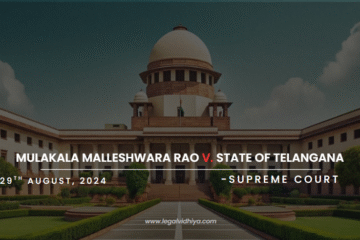
| CITATION | (2005) 3 SCC 202 |
| DATE OF JUDGMENT | 25th September 2023 |
| COURT | Supreme Court India |
| APPELLANT | M/s. Paul Rubber Industries Pvt. Ltd. |
| RESPONDENT | Amit Chand Mitra |
| BENCH | HON’BLE JUSTICE ANIRUDDHA BOSE & HON’BLE JUSTICE VIKRAM NATH |
INTRODUCTION
The legal issue at the heart of the case is whether or not an unregistered lease agreement can be utilized as proof in a real estate dispute. The main issue in the case is whether the lease agreement was for manufacturing purposes or some other kind of business usage. In relation to the admissibility of such an unregistered document under relevant legal laws, it also examines how “collateral purpose” is defined. How to settle them and how that choice will impact the parties’ rights and responsibilities are the case’s main issues.
FACTS OF THE CASE
The case involves a dispute regarding a lease agreement. The lease was entered into with a specific objective in mind and is only applicable to certain properties. One of the main issues is whether the lease was designed for manufacturing or another type of commercial usage. It should be noted that the contested lease agreement was unregistered. The fundamental issue is whether the unregistered leasing agreement can be used as evidence. In this instance, it is critical to consider how the word “collateral purpose” should be understood in light of the relevant legal rules. evaluating the type and character of possession as defined by the lease. The primary issue under dispute is whether the lease stipulated a six-month notice requirement or whether the tenancy was on a month-to-month basis. In the end, the case raises questions about the purpose and terms of the leasing agreement as well as the legality of using an unregistered document as evidence.
ISSUE RAISED
- In light of pertinent legal provisions and the idea of “collateral purpose” under the law, can an unregistered lease agreement be admitted as evidence to establish the purpose of the lease and the type of possession, particularly in situations where these factors are at the heart of the main dispute?
CONTENTIONS OF APPELANT
The appellant maintained that the leasing agreement should still be admissible in court even if it had not been registered. They maintained that it was possible to reference the unregistered lease agreement to determine the type and character of possession, which was necessary to determine the lease’s intended use. The requirements of Section 49 of the Registration Act served as the foundation for the appellant’s argument that unregistered papers could be utilized for collateral purposes. They used the Sevoke Properties Ltd. vs. West Bengal State Electricity Distribution Company Limited case as a precedent to evaluate the nature and character of possession. The appellant contended that the purpose of the lease was a crucial issue in the case and that it should be explored in the unregistered lease agreement. The appellant emphasized that information concerning the property’s intended use was contained in the unregistered lease agreement, pointing out that it was for the appellant’s factory and/or business. They argued that the lease’s description of the land, which made reference to a factory shed or “godown space,” showed that it would be utilized for production. Although the leasing agreement was unregistered, the appellant submitted that its nature and character of possession could be viewed as a collateral purpose for which it might be investigated. They provided precedent from prior decisions, such as Rai Chand Jain vs. Miss Chandra Kanta Khosla, to support their contention that the lease agreement might be utilized to determine the purpose of the lease. The opposing party’s arguments and evidence supported the appellant’s claim that it should be their obligation to prove that the lease was for manufacturing purposes.
CONTENTIONS OF RESPONDENT
The respondent maintained that the terms of the contested leasing agreement should not be admissible as evidence because it was not registered. They emphasized that the leasing agreement itself was the main point of controversy and that it was a key factor in the case. Citing Sections 107 of the Transfer of Property Act of 1882 and Sections 17 and 49 of the Registration Act of 1908, the respondent emphasized the necessity of such leasing agreements being lawfully registered. They contended that the appellant failed to fulfill the burden of establishing that the lease was for manufacturing purposes since the property’s description and other evidence could not conclusively establish this. In order to prove that unregistered lease agreements cannot be used to determine the nature and character of possession when that is the main issue in dispute, the respondent cited earlier court decisions, such as Sevoke Properties Ltd. vs. West Bengal State Electricity Distribution Company Limited. They argued that because the facts of Rai Chand Jain vs. Miss Chandra Kanta Khosla did not apply to the current case, the appellant erred by relying on them. The respondent maintained that the actual lease agreement made it plainly obvious what the lease’s declared purpose—that it was for the appellant’s factory or business—was. They argued that there was insufficient evidence provided by the appellant to support the assertion that manufacturing operations were taking place on the leased site. The reply made it plain that while the nature and character of possession could be taken into consideration for incidental purposes in some situations, it did not apply when it was the main issue at issue. In support of their assertion, they referenced the decision of Park Street Properties Private Limited vs. Dipak Kumar Singh, which held that without a registered instrument, courts could only determine whether a tenant existed but not why, particularly if the explanation required registration. The respondent claimed that the appellant must demonstrate that the lease was for manufacturing purposes in order to avoid a “month to month” tenancy.
JUDGEMENT
The dispute revolved around a leasing agreement that had not been registered as required by Indian law. The appellant stated that while determining the purpose of the lease, consideration should still be given to the unregistered lease. In deciding against the appellant, the High Court emphasized the significance of registration and criticized the use of an unregistered lease in its reasoning. The Supreme Court took preceding decisions and statutory provisions into consideration. The court reached the decision that although a document not registered might be used for collateral reasons, it could not be used to determine the lease’s fundamental purpose where registration was necessary for that purpose. Since the nature and character of possession was the primary concern in this instance, the unregistered lease could not be investigated. The Supreme Court maintained the legality of the High Court’s decision to deny the appellant’s appeal. The appeal received a similar denial, and there was no cost assessed. In principle, the decision emphasized the importance of registration in real estate transactions and clarified the precise circumstances in which a document that has not been registered may be used as collateral.
CONCLUSION
The importance of adhering to the registration procedures set forth by Indian law when transacting in real estate is underscored by this case, in my opinion. It emphasizes in particular that it cannot be used to determine the primary purpose of a lease in circumstances where registration is necessary. It explains clearly the circumstances in which an unregistered document may be taken into account for collateral purposes. The decision of the Supreme Court ensures that registration regulations are correctly administered and supports the legal framework controlling real estate transactions.
REFERENCE
This Article is written by Prazzal Mohanty student of SOA National Institute of Law, BBSR; Intern at Legal Vidhiya.




0 Comments